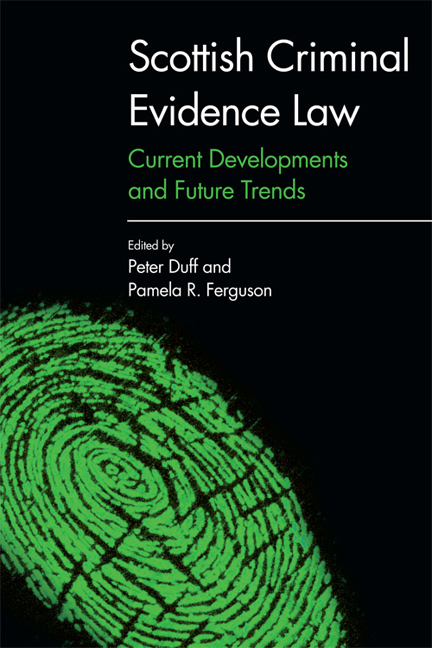Book contents
- Frontmatter
- Contents
- The Contributors
- Acknowledgements
- Table of Cases
- Table of Legislation
- Introduction
- 1 Cadder and Beyond: Suspects’ Rights and the Public Interest
- 2 ‘Access to Justice’ for Complainers? The Pitfalls of the Scottish Government’s Case to Abolish Corroboration
- 3 The Relevance of Sexual History and Vulnerability in the Prosecution of Sexual Offences
- 4 ‘Similar Fact’ Evidence and Moorov: Time For Rationalisation?
- 5 Hearsay in Scots law: Rethinking and Reforming
- 6 Eyewitness Identification Evidence and its Problems: Recommendations for Change
- 7 Assessing Witness Credibility and reliability: Engaging Experts and Disengaging Gage?
- 8 The process of Criminal Evidence Law Reform in Scotland: what Can We Learn?
- 9 Scottish Criminal Evidence Law Adrift?
- Bibliography
- Index
4 - ‘Similar Fact’ Evidence and Moorov: Time For Rationalisation?
Published online by Cambridge University Press: 24 April 2021
- Frontmatter
- Contents
- The Contributors
- Acknowledgements
- Table of Cases
- Table of Legislation
- Introduction
- 1 Cadder and Beyond: Suspects’ Rights and the Public Interest
- 2 ‘Access to Justice’ for Complainers? The Pitfalls of the Scottish Government’s Case to Abolish Corroboration
- 3 The Relevance of Sexual History and Vulnerability in the Prosecution of Sexual Offences
- 4 ‘Similar Fact’ Evidence and Moorov: Time For Rationalisation?
- 5 Hearsay in Scots law: Rethinking and Reforming
- 6 Eyewitness Identification Evidence and its Problems: Recommendations for Change
- 7 Assessing Witness Credibility and reliability: Engaging Experts and Disengaging Gage?
- 8 The process of Criminal Evidence Law Reform in Scotland: what Can We Learn?
- 9 Scottish Criminal Evidence Law Adrift?
- Bibliography
- Index
Summary
INTRODUCTION
This chapter analyses the operation of so-called ‘similar fact’ evidence in Scots law, the relationship between similar fact and the Moorov doctrine, and the possibility that this relationship has to an extent distorted the use of ‘similar fact’ evidence in our law. It considers the potential for the placing of ‘similar fact’ evidence on a more logical basis. In that context, it examines the proposals of the Scottish Law Commission and asks whether they stand up to scrutiny. Finally, it considers alternatives to the regime suggested by the Scottish Law Commission and offers suggestions for the future direction of the law.
A. ‘SIMILAR FACT’ EVIDENCE IN SCOTS LAW
(1) Background
Scots law has always taken the position that evidence of character is prima facie inadmissible – whether it is the character of an accused, a complainer, a party to a civil case, or indeed a witness – unless an individual's character is itself central to the proceedings, such as that of the pursuer in an action for defamation. The basis of inadmissibility has always been legal irrelevance, in the sense that the evidence is insufficiently relevant to justify the court considering such matters. Yet, despite this exclusionary rule, evidence which happens to reflect incidentally on an accused's character may be admissible if it relates directly to the issue of his guilt. In England, although the law in this area has now been placed on a statutory footing, the heading under which evidence of this kind has traditionally been discussed is that of ‘similar fact’. As will be seen, this is a rather misleading designation, since a great variety of evidence has tended to be grouped under a single label, whether or not it refers to acts of the accused similar to those with which he is now charged. Thus, while Lord Hope in the Privy Council case of S v HMA insists that ‘Scots criminal law has never admitted similar fact evidence’, what he means is that Scots law has never admitted such evidence in the true sense of the term, although other types of evidence which tend to be classified under this heading would certainly be admitted in a Scottish criminal trial.
- Type
- Chapter
- Information
- Scottish Criminal Evidence LawCurrent Developments and Future Trends, pp. 97 - 120Publisher: Edinburgh University PressPrint publication year: 2017



